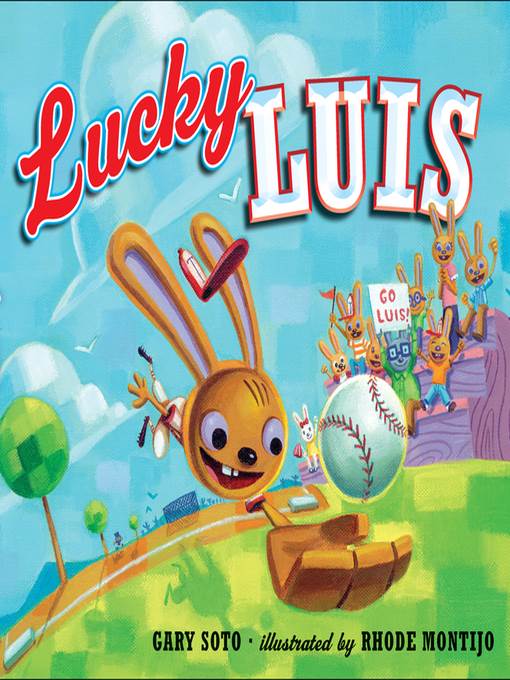
Lucky Luis
فرمت کتاب
ebook
تاریخ انتشار
2012
Reading Level
0-2
ATOS
3.1
Interest Level
K-3(LG)
نویسنده
Rhode Montijoشابک
9781101644188
کتاب های مرتبط
- اطلاعات
- نقد و بررسی
- دیدگاه کاربران
نقد و بررسی

February 6, 2012
From growing beards to wearing lucky socks, athletes’ superstitions can be unusual, and that’s certainly true of Luis, a rabbit who scoffs at the traditions his father had when he used to play (such as turning his belt to the side). But skeptical though he is, Luis comes to believe that his Little League success depends upon his eating a free sample at the grocery store before every practice or game—a unique superstition if ever there was one. Montijo’s canvas-textured acrylics create a cozy world shared by animals of different species (including a goat umpire and pig shoppers). Soto includes occasional Spanish words and phrases (they are not always translated, though most are common enough), as Luis learns that determination and hard work are more important than luck. Ages 3–5. Agent: Kendra Marcus, Bookstop Literary Agency.

February 1, 2012
A young Latino rabbit must overcome a snack-based superstition in this baseball-centered picture book. Luis, anxious about his Little League tryouts, is encouraged by his father, who reminisces about the strange things he and his fellow teammates did for luck. At the supermarket, Luis visits Mrs. Garza, the bear with the food samples he and the other kids call "tryouts." After enjoying his chorizo pizza, he manages to play well enough to make the team and stops for a sample on the way to the team's first practice. After another great performance, he connects his baseball abilities with his pre-practice supermarket snacking. Unfortunately, various forces keep Luis from his "tryouts," and his playing suffers. A couple of conversations with his father help him overcome his superstitious behavior in time for the big game, and he celebrates the victory with his extended family. Montijo's exuberant animal characters and bright acrylics will appeal to readers but may not be enough to make up for Soto's lackluster, wordy text. While baseball fans will be eager to enter Luis' world, others may find the abrupt scene changes jarring and the plot difficult to follow. The inclusion of Latino names and occasional Spanish words will make the book especially appealing to younger Latinos interested in the sport. The great illustrations would have benefited from simpler text. (Picture book. 4-7)
COPYRIGHT(2012) Kirkus Reviews, ALL RIGHTS RESERVED.

February 1, 2012
K-Gr 2-Little Leaguer Luis is a bunny with a serious case of game-day superstitions. His secret ritual involves swinging by the local supermarket for "tryouts" of food before the opening pitch. He is paralyzed by performance anxiety when an elderly turtle gets the last chili-flavored breadstick sample, and he ends the game without a single hit. When Luis finally tells his father about his superstition, the elder rabbit, who had lucky behaviors of his own when he was young, explains that winning in baseball is "about practice and listening to your coach." Finally, with the support of his entire extended family cheering him on in the stands, and prevented by the coach from using his father's belt-buckle-shifted-to-the-side trick, Luis sends the ball "flying over the second baseman's arm." Sprinkled with Spanish words, this story attempts to bring a Hispanic flavor to a traditional baseball story but fails to flesh out the tale with real cultural details. If the intended message is that superstitions don't make a great ballplayer, the final belt maneuver by all the male relatives undoes that sentiment. Montijo's warm, summer-hued acrylic illustrations perfectly set the scene for a ballgame. The rabbit protagonists sport oversize ears and large round eyes, giving them a certain comedic flair, but also making the dramatic tension in the story line seem anything but serious. This lightly seasoned tale lacks heat and should be considered only as a supplemental purchase where baseball books are a guaranteed home run.-Jenna Boles, Washington-Centerville Public Library, OH
Copyright 2012 School Library Journal, LLC Used with permission.

June 1, 2012
Grades K-3 Little League tryouts weigh heavy on Luis' shoulders. His father was a champion, and he left big shoes to fill. But Luis' tryout is brilliant, and he lands a spot on the team as cocaptain. A routine developsa stop at the grocery, a tryout from the samples lady, and then a successful baseball practice ( he smacked two doubles, laid down a perfect bunt, and snatched a high pop-up ). But when a botched game coincides with a missed stop at the store, Luis attributes the loss to the blown routine. From there things go from bad to worse, until Luis finds focus and learns that concentration, not superstition, is the name of the game. Soto's direct narrative, peppered with Spanish vocabulary, is well paced, building tension like a game of baseball itself. Montijo casts the characters as cartoony animals (Luis and family are rabbits), and sets the action against a saturated patchwork background of almost neon colors. This dynamic outing is both a sporting drama and a meaningful introduction to superstition.(Reprinted with permission of Booklist, copyright 2012, American Library Association.)

























دیدگاه کاربران